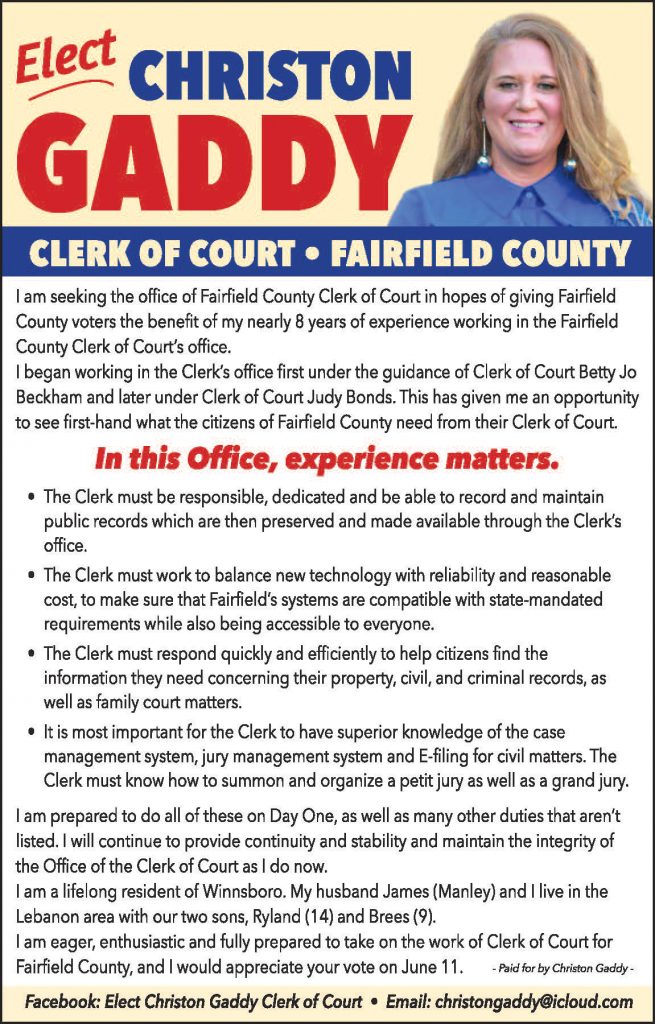WINNSBORO – Last week, Sixth Judicial Circuit Court Judge Brian Gibbons ruled on a motion to produce documents in a case that he said “has been going on too long,” and ordered the Jenkinsville Water Company (JWC) to turn over documents it had previously refused to produce to the owner of Broad River Camp Ground (BRCG), a JWC customer located near the V.C. Summer Nuclear Station.
After listening to about two minutes of arguments each from BRCG’s Winnsboro attorney Glen Bowens and JWC’s attorney Hanna Stetson of Turner Paget Law Firm in Columbia, Gibbons ruled quickly in BRCG’s favor.
Addressing JWC’s attorney, Gibbons continued.
“You’re to turn in this information. I give you 45 days. And I want this case mediated before the end of the year.”
BRCG’s owner, D. Melton, filed a lawsuit in October, 2014, against JWC alleging a breach of contract and a breach of contract “by a fraudulent act” after the company turned down the owner’s request to increase the number of sites at BRCG in Jenkinsville.
According to the suit, JWC claimed a water shortage and lack of water capacity as a reason for denying approval of the request for additional campsites.
During the ensuing three years, the suit alleges, Melton has submitted formal requests on three occasions to JWC for documents that could, the suit states, prove or disprove JWC’s claim. In the motion filed to compel JWC to produce the documents, Melton alleges that he has had little response to those requests.
The documents that must be handed over, according to the suit, are expected to serve as evidence to refute JWC’s claim of water shortage and lack of water capacity. Those documents include information about the amount of water available to JWC, the number of its customers, the number of new customers added and the amount of water those customers use. The requested documents relate, the suit alleges, to the number of customers added to the system, billing and usage records, well production and operation and water loss.
The suit also seeks a declaratory judgment to determine the rights of both parties in respect to an Oct. 28, 2009 contract in which the water company agreed to provide up to 8,050 gallons a day of water to Phase 1 of Melton’s Broad River Campground.
Under that 2009 contract, the daily consumption of water per site was estimated at 175 gallons per day (gpd), with the number of sites not to exceed 46 without written approval by JWC. The water company agreed to consider increasing its commitment of water if the campground wished to expand, the lawsuit states, “but only if that can be done without negatively impacting other customers of the water system.”
Because the campground was not using all of the 8,050gpd that JWC agreed to provide in 2009, there was a surplus of water available to the campground. Based on the usage records, provided by JWC, the suit states that in 2012 each campsite was using approximately 10.4gpd, not the previously estimated 175gpd. That year, Melton requested and received approval from JWC to open an additional 24 sites. The daily consumption of water per site was lowered to 53 gallons per day, based on a water study and use history since 2009 of the campground.
“The 70 campsites at the estimated usage rate of 53gpd are using 3,710gpd, leaving a surplus of 4,340gpd from the 8,050gpd JWC agreed to provide,” the suit claims. This still left the campground with a surplus of water available based on the 8,050gpd limit which remained in place, the suit states.
In May, 2014, Melton requested an additional 49 camp sites and sought from JWC a willingness to serve letter, which is required by the S.C. Department of Health and Environmental Control (DHEC) before the new waterlines could be constructed.
“The new (49) campsites at 53gpd would only use 2,597gpd, leaving a surplus of 1,743gpd,” the suit states. While the lawsuit further states that Melton did not request an increase of actual water beyond the 8,050gpd limit, the water company “has unreasonably refused permission for the additional campsites.”
That refusal, the lawsuit alleges, constitutes a breach of the parties’ contract.
“JWC’s claim that it does not have the water capacity to provide water service to the 49 campsites suggests that JWC is selling the surplus water from the 8,050gpd to other customers, which is preventing [the campground] from using more of the water it contracted to receive and JWC agreed to provide,” the suit alleges. It further claims that, “The practice of selling water allocated to one customer to other customers is an unfair and deceptive trade practice.”
In an amended complaint, Melton alleges that the documents he is requesting from JWC are evidence that JWC gives preferential treatment to residential customers over commercial customers as well as evidence of the scope of the preferential treatment given to residential customers.
Melton states in the suit that JWC has refused to produce the requested documents in an effort to prevent the campground from refuting JWC’s claims of water shortage, lack of water capacity, adverse impact on existing customers, from proving a violation of the waiting list policy and JWC’s unfair trade practice of selling water allocated to one customer to other customers and preferring residential customers to commercial customers.
In addition to asking the Court to grant the motion for JWC to turn over documents, Melton’s suit also asks JWC to pay the costs the campground has incurred in bringing the motion.












